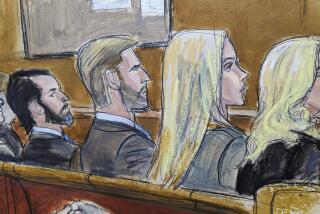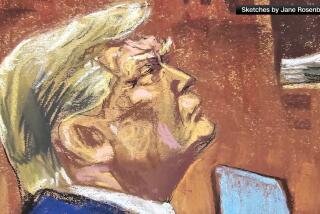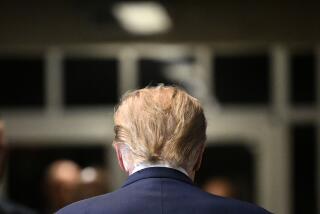‘What Kind of Lesson Is That for Our Kids?’
- Share via
Excerpts from some of the questions from senators and answers from lawyers presenting their cases at the Senate impeachment trial:
Question:
From Sen. Patrick J. Leahy (D-Vt.):
Did any of the managers consult with any member of the Senate before seeking aid from Kenneth Starr to speak with Ms. Lewinsky? Did you discuss whether this violated the Senate’s 100-to-nothing vote on trial procedure?
Answer:
From Rep. Bill McCollum (R-Fla.):
We did not consult with any senators about this. We don’t think that what we wanted to do to talk to Ms. Lewinsky had anything to do with the rules that you’ve passed. We do not want to violate those rules, and we don’t think that we have.
As anybody who knows if you have a witness that you’re going to produce, you have a right to prepare that witness . . . you’re going to go down and try to talk to that witness and prepare that witness. You have the right to do that and the obligation to do that. It has nothing to do with the formal proceeding of taking the deposition, which is covered by the rules that you’ve passed as to how and when depositions will be taken.
Question:
From Sens. Susan Collins (R-Maine), Mike DeWine (R-Ohio) and Barbara A. Mikulski (D-Md.):
With all of the conflicting testimony that exists on the record between Monica Lewinsky and Betty Currie, for example, how are we to resolve the questions of perjury and obstruction of justice without observing the demeanor of witnesses?
Answer:
From Rep. Asa Hutchinson (R-Ark.):
I don’t think there is any way to resolve the conflicts in their testimony without calling the witnesses. Particularly whenever you’re looking at whether there’s Monica Lewinsky or Betty Currie, there’s the follow-up questions, there’s the demeanor that allows you to determine who’s telling the truth and who you believe.
And maybe somebody is lying. But a jury, in this case the senators, can look at this and say, “Well, someone is not recalling the same way; someone is more believable because their recollection is better, it’s corroborated,” or you could conclude that someone is lying. But it always doesn’t break down that simply. But you have to evaluate that, and that’s how you resolve it.
Question:
From Sen. Paul Wellstone (D-Minn.):
To what extent should the views of the American people be taken into account in considering whether a president should be removed from office?
Answer:
White House Counsel Charles F.C. Ruff:
I think that the answer to that question is not the polls that you read in the newspapers or that you see on your evening news. Whatever those numbers may be, that’s only one clue as to what the American people are thinking. And each of you knows the people in your jurisdiction far better than any poll taker does and than certainly I do.
But surely one way to test the ultimate question . . . is to ask yourself, on the basis of experience over the last year, . . . has your sense of the political structure of this country and what the people are saying to you and what your sense of their needs are, do they need the kind of cleansing that Manager [Stephen E.] Buyer spoke about?
And I think the answer to that, if you look within the body of people who you are most familiar with, must be no.
Question:
From Sen. Trent Lott (R-Miss.):
Do you have any comment on the answer given by the president’s counsel with regard to the views of the American people?
Answer:
From Rep. Henry J. Hyde (R-Ill.):
Edmund Burke was asked that once, and he said that a member of parliament owes the highest degree of fidelity to his constituents, but he doesn’t owe his conscience to anybody. We have, or we have not, a representative democracy. We’re not delegates who are sent here to weigh our mail every day and then to vote accordingly. Our work here is not an ongoing plebiscite. We are elected to bring our judgment, our experience and our consciences with us here. I have always believed, and I believe more firmly than ever, and this experience confirms me in that belief: There are issues of transcendent importance that you have to be willing to lose your office over.
I can think of several that I’m willing to lose my office over. Abortion is one. National defense is another. Strengthening, not emasculating, the concept of equal justice under law. My life is devoted as a lawyer. I’ve been on the Judiciary Committee, this is my 25th year. And equal justice under the law is what moves me and animates me and consumes me, and I’m willing to lose my seat any day in the week rather than sell out on those issues.
Despite all the polls and all the hostile editorials, America is hungry for people who believe in something. You may disagree with us, but we believe in something.
Question:
From Sens. Wayne Allard (R-Colo.), Collins, Orrin G. Hatch (R-Utah), Kay Bailey Hutchison (R-Texas) and Olympia J. Snowe (R-Maine):
In your view, how might acquittal in this case affect laws regarding sexual harassment?
Answer:
From Rep. James E. Rogan (R-Glendale):
Consider what would happen if victims of the workplace get a message from the Congress of the United States that what the president did with Paula Jones or allegedly did with Paula Jones is of no constitutional significance here. It would send a message to every woman in the workplace that if they have a complaint against an employer who is attempting to use a position of power and authority to pursue improper advancements, the message would be that you might as well just keep quiet about it because the person can lie in court and suffer no recrimination.
Question:
From Sens. Barbara Boxer (D-Calif.), Dianne Feinstein (D-Calif.), Mary Landrieu (D-La.), Mikulski and Patty Murray (D-Wash.):
Has Ms. Lewinsky ever claimed the relationship was other than consensual, and was not Ms. Jones’ case dismissed as having no claim recognized by law?
Answer:
From Ruff:
No and yes. Indeed, as Mr. Manager Rogan has told you and others before him on the managers’ side, our sexual harassment laws and our civil rights laws are of critical importance to all of us. My colleague, Ms. [Cheryl] Mills, I think spoke eloquently on that subject a couple of days ago.
But it’s important to understand, I believe, with no sense at all that we are in any way diminishing the importance of those laws and of the rights of every American citizen to seek justice under those laws, that we are talking about a case in which the trial judge determined that on all the evidence that had been gathered and all the claims that the plaintiff had made and all the discovery that had been taken, there was no case.
Question:
From Sen. Max Baucus (D-Mont.):
In view of the direct election of the president, his popularity and short duration of his term, and in view of the fact that as House Manager [Bob] Graham stated, reasonable people can differ in this case, please explain precisely how acquitting the president will result in an immediate threat to the stability of our government.
Answer:
From Hyde:
I don’t think anyone contends that if the president is acquitted that suddenly it’s “Apocalypse Now” or the republic will be threatened from without or from within. I think erosion can happen very slowly and very deliberately.
The problem that I have is with this office being fulfilled by someone who has a double responsibility. The first responsibility is to take care that the laws be faithfully executed. He’s the only person in the country, in the world, that has that compact with the American people. The other, of course, is his oath to preserve, protect and defend the Constitution.
He is the national role model. He is the man. He is the flag bearer in front of our country. He is the person, his office is the person every parent says to their little child, “I hope you grow up and be president of the United States some day.”
And when you have a president who lies and lies and lies under oath--and that’s the key phrase, “under oath”--I don’t care about his private life or his matters that are not public, but when he takes an oath to tell the truth, the whole truth, nothing but the truth and then lies and lies and lies, what kind of a lesson is that for our kids and our grandkids? What does it do to the rule of law?
More to Read
Get the L.A. Times Politics newsletter
Deeply reported insights into legislation, politics and policy from Sacramento, Washington and beyond. In your inbox three times per week.
You may occasionally receive promotional content from the Los Angeles Times.









